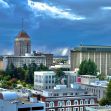Drones are changing the way police respond to 911 calls, but like all new technologies, courts are being challenged by how to respond to their use.
The city of Chula Vista, California, is conducting a first-in-the-nation pilot program that uses drones as first responders to emergency calls for help. The city’s police department can send a drone to check out the situation by streaming video back to them. After checking out the situation, officers can decide how to respond. The Federal Aviation Administration (FAA) had selected the Chula Vista Police Department (CVPD) as the location of the drone pilot program that could replace helicopters or drones used by on-scene police officers for useful surveillance.
The publisher/editor of La Prensa, a bilingual Latino newspaper and website based in San Diego County, Arturo Castañares, wanted to learn more about the drone program. He petitioned the City for information regarding 91 hours of drone flights the police department ordered from March 1 to March 31, 2021. The CVPD complied with all of his requests, except for the video footage itself. The CVPD cited the California Public Records Act §7923.600 (CPRA), which says photos and video “are considered part of the investigative record and are not available to the public…and are not public records.”
Castañares then agreed to withhold from his request any videos that are part of a current police investigation. Nonetheless, San Diego Superior Court Judge Timothy Taylor denied the request in a minute order. He cited the same section of the CPRA as the one used by the police department. Castañares then filed a petition for an “extraordinary writ” to have the judges in Division One of California’s Fourth Appellate District direct the City to vacate its order and disclose any video that was not related to an ongoing police investigation.
In a unanimous 3-0 opinion authored by Acting Presiding Justice Richard D. Huffman on December 27, the appellate court said, “We agree with Castañares that the superior court erred in determining, as a matter of law, all video footage from the drone program is exempt under section 7923.600, subdivision (a) as records of investigations. However, it might be the case, after further inquiry, consistent with this opinion, that the majority of the video footage is exempt. That said, we cannot make that determination on the record before us.” He then granted relief in part and remanded the matter back to the superior court to conduct further proceedings.
Huffman’s opinion provided extensive background information about the pilot program. He explained that Congress had authorized the program, which included many privacy-related recommendations suggested by the American Civil Liberties Union. He also noted that CVPD’s website gave extensive details about the program.
Next, the opinion provided details about California’s Public Records Act, which was designed to provide access to information concerning “the conduct of the people’s business,” while providing appropriate exemptions to protect privacy or certain government investigations. Huffman quickly narrowed the opinion to discuss video footage that was not part of an investigatory file, which both parties agreed would still be exempt.
Castañares tried to argue that his case was similar to one in which police used automated license plate readers to scan over a million vehicles per week, so they could locate drivers whose crimes were under investigation. In that case, the California Supreme Court ruled that the “license plate scans did not produce records of investigations, because the scans are not conducted as part of a targeted inquiring into any particular crime…” They said it was “bulk data collection,” not an investigation. Huffman distinguished the instant case from Castañares’s because the license plate scans were “random,” and the petitioner’s was clearly covered by the CPRA’s investigations exemption.
A key question raised by this petition is what constitutes an investigation. Petitioner argues that drones are used for many other reasons, such as monitoring brush fires. In addition, all of the video shot by drones does not result in police investigations. Because of the City’s overreach, the opinion concluded,
“…the trial court’s broad ruling that all drone video footage, as a matter of law, is categorically exempt because the drones are only dispatched in response to 911 calls was error.” Therefore, Huffman wrote, “we conclude a more nuanced approach to the drone video footage is apt” and must be evaluated on a case-by-case basis. That way, petitioners such as Castañares can “challenge or question” any individual decision the City makes.
The CVPD had one final argument. It cited the CPRA’s provision that a public agency can withhold a public record if it shows “that on the facts of the particular case the public interest served by not disclosing the record clearly outweighs the public interest served by disclosure of the record.” Finding this “catchall provision” potentially burdensome, Huffman said, “We must conclude that the City did not carry its burden in showing the catchall provision applies here.”
The appellate court then remanded the matter back to the trial court, with the suggestion that the requested drone-taken video be divided into three categories – that which is part of an investigative file, that which relates to a law that has been broken, and that which requires a factual inquiry. The first two will remain exempt under the CPRA. The last will lead to individualized determinations made on a case-by-case basis.






